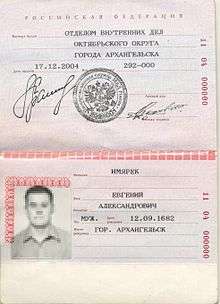Internal passport of Russia
| Internal Russian passport (Russian: Внутренний паспорт гражданина Российской Федерации) | |
|---|---|
 An example of an internal Russian passport | |
| Issued by |
|
| Eligibility requirements | 14 years of age |
| Expiration | Renewed at age 20 and 45 |
The Internal Russian passport (officially in Russian: Паспорт гражданина Российской Федерации, commonly referred to as внутренний паспорт, общегражданский паспорт) is an identity document for Russian citizens who are aged 14 or over.
History
In 1992, passports – or other photo identification documents – became necessary to board a train. Train tickets started to bear passenger names, allegedly, as an effort to combat speculative reselling of the tickets.
On 9 December 1992, special pages were introduced which were affixed in Soviet passports, certifying that the bearer of the passport was a citizen of Russia. These pages were optional unless travelling to the other former Soviet republics which continued to accept Soviet passports; for other occasions, other proofs of citizenship were accepted as well. Issuance of the pages continued until the end of 2002.
On 8 July 1997, the currently-used design of the Russian internal passport was introduced.[1] Unlike the Soviet passports, which had three photo pages, the new passports only have one. A passport is first issued at the age of 14, and then replaced upon reaching the ages of 20 and 45. The text in the passports is in Russian, but passports issued in autonomous entities may, on the bearer's request, contain an additional page duplicating all data in one of the official local languages.
A deadline for exchanging old passports for the new ones was initially set at year-end of 2001, but then extended several times and finally set at 30 June 2004. The government had first regulated that having failed to exchange one's passport would constitute a punishable violation. However, the Supreme Court ruled to the effect that citizens cannot be obliged to exchange their passports. The Soviet passports ceased to be valid as means of personal identification since mid-2004, but it is still legal (though barely practical) to have one.
The propiska was formally abandoned soon after adoption of the current Constitution in 1993, and replaced with "residency registration" which, in principle, was simply notification of one's place of residence.
Nevertheless, under the new regulations, permanent registration records are stamped in citizens' internal passports just as were propiskas. This has led to the widespread misconception that registration was just a new name for the propiska; many continue to call it "propiska". This misconception is partly reinforced by the fact that the existing rules for registration make it an onerous process, dependent on the consent of landlords, which effectively prevents tenants of flats from registering.
Internal Russian passports are issued only inside the country. Russian citizens who live abroad can get internal passport only if they visit Russia, i.e., it is not possible to get internal passport in the Russian consulate abroad. In practice, Russian citizens who live abroad often do get new internal passports at all, as the law allows them to prove their identity with an international Russian passport (travel document).
Replacement with Universal Electronic Cards
In November 2010 Federal Migration Service announced the possible cancellation of internal passports, replacing them with plastic ID cards or driver's licenses.[2] Starting from 1 January 2013, so called Universal electronic cards (Russian: Универсальная электронная карта) are being issued. By the year 2015 they are starting to fully replace old internal passports.[3] Nevertheless, the number of people to whom these cards were issued is negligible.
Gallery
-

First page
-

Second page
-

Passport page number
-

Text in Russian: "place of residence: Irkutsk". Almost every citizen has such stamp in internal Russian passport about registration at the place of residence (sometimes still called "propiska").
See also
- Identity card of the Russian Armed Forces
- Visa requirements for Russian citizens
- Russian passport
- Passport system in the Soviet Union
- Migration card
- Propiska in the Soviet Union
- Wolf ticket (Russia)
- 101st kilometre
- Closed cities
References
- ↑ Decree of the President of the Russian Federation from 13.03.1997 N 232 ‘About main identity document of the citizen of the Russian Federation on the territory of the Russian Federation’ (Указ Президента РФ от 13.03.1997 №232 Об основном документе удостоверяющем личность гражданина Российской Федерации на территории Российской Федерации).
- ↑ "BBC Russian – Россия – Россия упрощает регистрацию и хочет отменить паспорта" (in Russian). BBC. 2010-11-18. Retrieved 2010-11-19.
- ↑ Innes, Joe (2013-01-23). "Russian Domestic Passports to Be Replaced by Smart Cards". russiaSLAM. Retrieved 2013-01-23.